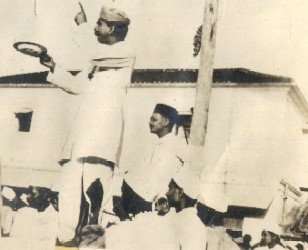|
|
|
Seth Govinddas with Pandit D.P. Mishra |

General Election of 1926 and the condition in Central Province
|
|
|
Seth Govinddas with Pandit D.P. Mishra |
The
clouds of financial crisis were hovering over Govind Das ji’s family. Though
crisis had been there since 1913 but the situation now became worse as the
expenses of Govind Das ji’s social life increased by 1925 election to Council
of State.
The
situation became worse as all responsibility pertaining to the Congress party
fell upon Govind Das ji. It was a period which also saw the bringing out of
publication under the name ‘Lokmat’. Pt. Dwarika Prasad Mishra was entrusted
with the responsibility of Chief Editor. Slowly with time, it gained popularity
and became the first choice of the people.
The
period also witnessed the rise of new leadership in the form of Govind Das ji.
Keshavramchandra Khandekar of Sagar had been the President of Regional Congress
Committee. During the 1926 election of the committee, Govind Das ji was elected
as member of the committee. The following year Khandekar proposed to elect
Govind Das as President, which was unanimously accepted. Govinddasji appointed
Pt. Dwarika Prasad Mishra and Lakshman Singh Chauhan as Secretaries.
Lahore
Congress Session
The
Bardoli Satyagraha enhanced the enthusiasm, which was aroused among the people
of the country during the boycott of the Simon Commission. Sadar Vallabhbhai
Patel successfully undertook the Satyagraha. Lord Irwin, then the Viceroy of the
country returned from England with declaration that British government would
lend an ear to the Indian demands and for this a Round Table Conference has been
called.
A
conference was convened at Delhi where Congress accepted the declaration on some
conditions. But somehow the terms were not accepted. Gandhiji, Mr. Jinnah and
Mr. Patel made last attempt by holding discussion with Viceroy just before the
Lahore Congress Session. But it proved to be futile.
The
country was all set for struggle. The National Congress soon reflected this new
mood. The first step was to reconcile the militant left wing of the Congress.
Jawaharlal Nehru was now made the President of the Congress at the historic
session of the Congress at Lahore in 1929, son had succeeded father (Motilal
Nehru was the President of the Congress in 1928) as the official head of the
national movement. The Lahore session of the Congress gave voice to the new
spirit. It passed a resolution declaring Poorna
Swaraj (Complete Independence) to be the Congress objective. On December 31,
1929 was hoisted the newly adopted tri-colour flag of freedom. At the same time,
January 26, 1930 was fixed as the first Independence Day. The session was also
marked by official announcement of the launch of ‘Civil Disobedience
movement’.
Gandhiji
started the movement on March 12, 1930 with the famous Dandi March. Together
with 78 chosen followers, Gandhiji walked nearly 375 km from Sabarmati Ashram to
Dandi, a village on Gujarat seacoast. On
April 6, he picked up salt and broke the salt law as the symbol of the Indian
people’s refusal to live under British made-laws and therefore under British
rule.

|
|
Salt Satyagrah |
The
significant development in the Central Province during this period was the
naming of the Hindustani Central Province as Mahakoshal. As Gandhiji was on
Dandi March, a meeting of All India Congress Committee was organised at
Ahmedabad. The atmosphere of the region was filled with enthusiasm. This was
much highlighted through the articles of ‘Lokmat’.
The
Political council laid the plan for the Satyagraha in the Mahakoshal area. Since
the province was not on the cost ‘Namak Satyagraha’ could not be carried
out, therefore ‘Jungle Satyagarha’ was chalked out. Pt. Ravishankar Shukla
took the responsibility for the programme in Chattisgarh while Govind Das ji
took responsibility for Jubbulpore.
It
was decided by consensus to organise public meetings and read literature banned
by the British government. This step proved to be a successful one. The speech
given by Seth Govind Das ji on one occasion during the Civil Disobedience was
indeed a turning point, for he condemned the actions of his great grandfather
Seth Kushalchand ji for extending assistance to the British government during
the revolt of 1857. This step by drew the attention of the British government.
Arrest warrants were issued.